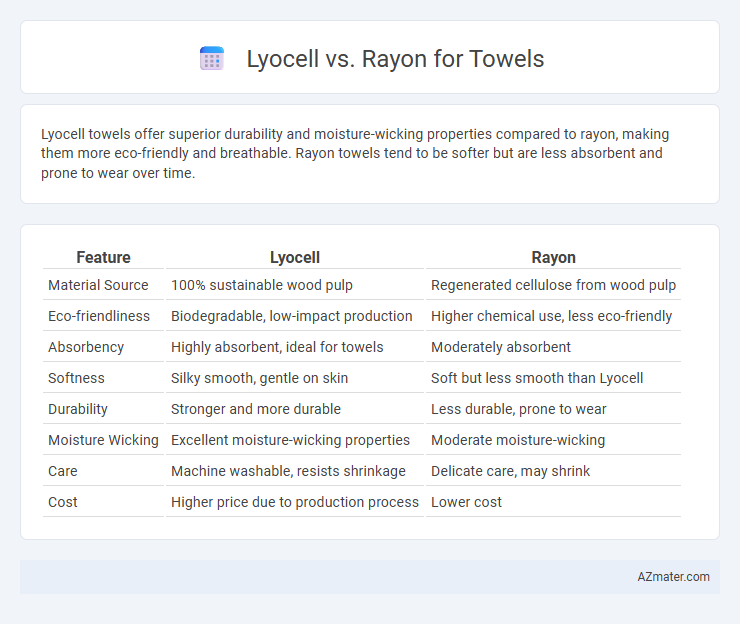Lyocell towels offer superior durability and moisture-wicking properties compared to rayon, making them more eco-friendly and breathable. Rayon towels tend to be softer but are less absorbent and prone to wear over time.
Table of Comparison
| Feature | Lyocell | Rayon |
|---|---|---|
| Material Source | 100% sustainable wood pulp | Regenerated cellulose from wood pulp |
| Eco-friendliness | Biodegradable, low-impact production | Higher chemical use, less eco-friendly |
| Absorbency | Highly absorbent, ideal for towels | Moderately absorbent |
| Softness | Silky smooth, gentle on skin | Soft but less smooth than Lyocell |
| Durability | Stronger and more durable | Less durable, prone to wear |
| Moisture Wicking | Excellent moisture-wicking properties | Moderate moisture-wicking |
| Care | Machine washable, resists shrinkage | Delicate care, may shrink |
| Cost | Higher price due to production process | Lower cost |
Introduction to Lyocell and Rayon
Lyocell towels, made from sustainably sourced wood pulp, offer superior moisture absorption and durability compared to traditional rayon towels, which are regenerated from cellulose fibers through a chemical-intensive process. Lyocell's closed-loop production minimizes environmental impact, making it a more eco-friendly alternative to rayon, which often involves toxic solvents in manufacturing. Both fibers provide softness and breathability, but Lyocell stands out for its strength and biodegradability, ideal for high-quality towels.
What is Lyocell?
Lyocell is a sustainable fiber made from wood pulp, known for its softness, durability, and high moisture absorption, making it ideal for towels. Unlike rayon, which uses a chemical-heavy process, lyocell is produced through an eco-friendly closed-loop process that recycles solvents and reduces environmental impact. Towels made from lyocell offer superior breathability and absorbency while maintaining a smooth texture and resistance to shrinkage.
What is Rayon?
Rayon is a semi-synthetic fiber made from regenerated cellulose derived from wood pulp, commonly used in textiles for its softness and absorbency. Unlike Lyocell, which utilizes a more environmentally friendly closed-loop production process, traditional rayon manufacturing involves chemical-intensive steps that can have greater environmental impacts. Rayon towels offer a smooth feel and good moisture-wicking properties but may lack the durability and strength found in Lyocell-based towels.
Comparison of Lyocell and Rayon Manufacturing Processes
Lyocell manufacturing involves a closed-loop process using non-toxic solvents that minimize environmental impact, whereas Rayon production typically relies on chemical-heavy treatments with toxic solvents like carbon disulfide, posing health and pollution risks. Lyocell fibers are produced through direct dissolution of cellulose and are regenerated with minimal chemical waste, while Rayon undergoes a complex viscose process that generates more hazardous byproducts. This distinction in manufacturing processes results in Lyocell towels being more sustainable and eco-friendly compared to conventional Rayon towels.
Softness and Texture: Lyocell vs Rayon Towels
Lyocell towels offer superior softness and a smooth, silky texture due to their regenerated cellulose fibers derived from eucalyptus wood, providing enhanced moisture absorption and breathability. Rayon towels, made from chemically processed cellulose fibers, tend to be softer initially but may lose their texture and durability after repeated washes compared to Lyocell. The natural fiber structure of Lyocell contributes to a more luxurious feel and long-lasting softness, making it a preferred choice for premium towel fabrics.
Absorbency and Drying Performance
Lyocell towels exhibit superior absorbency compared to rayon due to their unique fiber structure that efficiently wicks moisture away from the skin. Lyocell's natural cellulose fibers enable faster drying times, reducing the risk of bacterial growth and odors. Rayon towels, while soft, tend to retain more water and take longer to dry, making Lyocell a more practical choice for high-performance absorbency and drying efficiency.
Durability and Longevity
Lyocell towels offer superior durability and longevity compared to rayon towels due to their strong, tightly bonded cellulose fibers that resist wear and maintain softness after repeated washing. Rayon, while soft and absorbent, tends to weaken and pill over time, reducing the towel's lifespan significantly. The eco-friendly production process of lyocell also contributes to its enhanced fabric strength and sustained performance in everyday use.
Eco-Friendliness and Sustainability
Lyocell towels offer superior eco-friendliness compared to rayon due to their closed-loop production process that recycles water and solvents, minimizing environmental impact. Rayon towels, derived from chemically treated wood pulp, involve toxic chemicals in their manufacturing, resulting in greater pollution and less sustainability. Lyocell also boasts biodegradability and reduced water usage, making it a more sustainable choice for environmentally conscious consumers.
Price Comparison: Lyocell Towels vs Rayon Towels
Lyocell towels generally cost more than rayon towels due to their eco-friendly production process and superior durability. Rayon towels are more budget-friendly but often lack the longevity and moisture-wicking properties found in lyocell options. The price difference reflects lyocell's sustainable sourcing and enhanced softness, making it a premium choice for high-quality towels.
Which is Better for Towels: Lyocell or Rayon?
Lyocell towels offer superior moisture absorption and durability compared to rayon, making them more effective for drying and longer-lasting with consistent use. Rayon, though soft and smooth, tends to lose strength when wet and is less eco-friendly, resulting in shorter lifespan and potential environmental concerns. Choosing lyocell for towels ensures better performance, sustainability, and a more comfortable user experience.

Infographic: Lyocell vs Rayon for Towel
 azmater.com
azmater.com